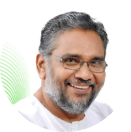Violence and Centralisation
- Views and Words / 23
- 29-11-2022
- 03 Min Read
Effective communication is a necessary precondition for the maintenance of peace and harmony, because if one does not understand the other he is inculcating fear in the other. If the other inculcates fear in me, naturally I will be getting away from him and there cannot be effective cooperation. So if I want to cooperate with the other, I must be able to understand him. To understand means, there should be effective means of communication between I and him. If this effective communication is not possible, then naturally the other becomes an unknown continent; an unknown continent always creates fear and fear provokes one to conquer and the control the other.
Anything that is unknown in the world creates fear and fear is the reason for the violence against the other. Violence really is the creation of fear and fear is due to lack of effective communication. If one is able to understand that there is nothing uncommon between I and you then naturally that person must be able to get in touch with the other because there is a level of identity between the two. If such a level of identity is not able to be experienced by the person, then such a person will naturally turn to weapons as a means of protection. What I am telling is that similar persons are in need of effective tools of communication and effective communication should be the essential precondition for the maintenance of peace in oneself as well as in others in the society. Only then a peaceful society can be a free society.
Freedom can be attained only when one is able to practice non-violence and the moment one practises violence, he/she must be imprisoned by fear as well as the other entities which make anyone incapable of getting in touch with the other. So, a free man must be a man of non violence; non-violence in the sense that one should be able to make use of the minimum for himself as well as for others. So, the idea of sharing is the essential part of non-violence and freedom. A free man must be able to share everything with him with others. That’s why Jesus has once made it clear that if you have got two with you, you have to spare one to the other. This means that there is identity between one and the other. This identity has to be realised. That identity can be realised only by means of effective communication. The moment one is not able to understand the identity between oneself and the other he has to keep everything for himself because he never sees any reason to share whatever he has. The moment he sees that he has to keep everything for himself, he is centralising them be it money or position.
Centralisation of money position etc. can easily be the necessary and the most explicit form of violence. Wherever there is centralisation of power and money, such a place can never be free from violence. So, violence means centralisation and decentralisation means non-violence. If you want to share whatever be with you with others, then you have to realise that there is identical element in yourself and the other, just because one realises that, one must be able to share whatever be with him, with the others. In a non-violent activity, a free man must be able to share whatever has. So a free man must be able to share money and food with others. A society that shares everything with others can be treated as a free society. Advaita System firmly believes that a non-violent society can never be a society that believes in centralisation of power, money etc. Power and money can be decentralised in the sense that it must be shared with the rest and such a sharing process alone will be able to guarantee freedom. This is the basis of pluralism. What I mean is that a pluralistic society must be a free society, a free society must be a non-violent society which does not believe in centralisation of anything. Such a de-centralised society that is capable of sharing resources with the other alone will be able to maintain peace harmony.
These texts are as given by Dr K S Radhakrishnan, a renowned writer and an voracious reader, during 2010-2014. These posts help us dig into the inner meanings of Indian culture, Scriptures and heritage.


